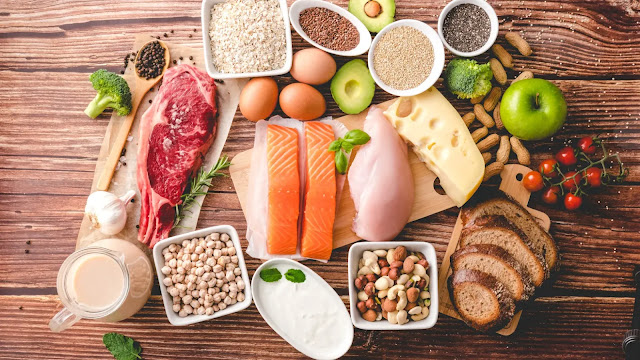When Dieting When Is The Best Time To Eat
Introduction: Unlocking the Power of Timing in Achieving Dieting Success
This comprehensive article aims to shed light on the significance of meal timing in achieving dieting success. We will embark on a fascinating exploration of the intricate relationship between the timing of our meals and our bodies response to them.
Throughout this article, we will delve into various aspects of timing, ranging from the influence of our body's internal clock, known as the circadian rhythm, to the impact of different meal timings on energy levels, productivity, and even sleep quality. By understanding these principles, you will gain valuable insights into optimizing your dieting efforts and attaining your desired health and weight goals.
So, join us on this enlightening journey as we debunk myths, unveil scientific findings, and provide practical strategies to help you make informed choices about when to eat. Together, we will unlock the power of timing and pave the way to a successful dieting experience.
Now, let's dive into the structure of this article to give you a comprehensive overview of the topics we will explore, ensuring you're equipped with the knowledge you need to embark on this transformative journey.
Understanding the Digestive Process: Unraveling the Inner Workings of Digestion
An Overview of the Digestive System: The Journey Begins
Understand the roles of each organ in breaking down food into nutrients and absorbing them into the bloodstream.
The Role of Enzymes in Digestion: Unlocking the Power of Catalysts
Learn how different enzymes work synergistically to ensure optimal digestion and nutrient absorption.
Hormones and Digestion: The Messengers of the Digestive System
Explore how hormonal imbalances can impact digestion and potentially contribute to weight management challenges.
The Circadian Rhythm and Meal Timing: Harnessing the Power of Biological Rhythms
The Concept of the Circadian Rhythm: Unveiling Nature's Timekeeper
Understand the fundamental principles of the circadian rhythm, a natural internal process that regulates our sleep-wake cycle, hormone production, body temperature, and more.
Discover how the circadian rhythm is synchronized with external cues, such as light and darkness, to maintain harmony in our physiological functions.
The Intricate Dance: How Meal Timing Affects the Circadian Rhythm
Explore the interplay between meal timing and the circadian rhythm, as specific time windows for eating can influence our body's response to food.
Uncover the impact of irregular eating patterns, such as late-night meals or skipping meals, on circadian rhythm disruption and potential health consequences.
Optimizing Meal Timing for Circadian Alignment: Finding Balance and Synchrony
Learn strategies for aligning meal timing with the natural rhythms of your body to maximize digestion, nutrient absorption, and metabolic efficiency.
Discover the concept of time-restricted eating and its potential benefits in supporting circadian rhythm alignment and overall health.
Breakfast: The "Most Important" Meal? Dispelling the Myth and Unveiling the Truth
For decades, we have been bombarded with the notion that breakfast is the most important meal of the day, the cornerstone of a healthy diet. It has become deeply ingrained in our cultural beliefs and dietary guidelines.
However, recent research and evolving perspectives have shed new light on the role of breakfast in our overall well-being. In this section, we will delve deep into the myth of breakfast's significance, examining the scientific evidence and exploring the potential benefits and drawbacks associated with this widely held belief.
Debunking the Myth of Breakfast as the Most Important Meal
Journey back in time and uncover the historical origins of the "breakfast is the most important meal" concept, tracing its roots in early dietary recommendations.
Understand how cultural factors and industry influence have shaped our perception of breakfast as a crucial meal for health and vitality.
Unraveling the Science: Questioning Assumptions and Examining Research
Explore recent scientific studies that challenge the traditional notion of breakfast as the ultimate start to the day.
Examine the limitations and biases present in early breakfast research, leading to potential misinterpretations and the propagation of the myth.
Benefits of Eating Breakfast: Separating Fact from Fiction
Delve into the potential benefits associated with eating breakfast, including improved cognitive function, enhanced nutrient intake, and better appetite control.
Explore the nuances and contextual factors that influence the significance of these benefits, such as individual variations, lifestyle factors, and dietary choices.
Drawbacks of Eating Breakfast: Scrutinizing the Assumptions
Question the assumptions surrounding breakfast and explore the potential drawbacks of traditional breakfast patterns, such as unintended overconsumption of calories and reliance on processed breakfast foods.
Investigate the emerging trends of intermittent fasting and alternative meal patterns, highlighting their potential advantages for certain individuals and specific health goals.
The Mid-Morning Snack: Fueling Your Day with Sustained Energy
As the morning progresses, our energy levels may start to dip, leaving us in need of a revitalizing boost. Enter the mid-morning snack – a convenient and nourishing way to refuel and keep our energy levels steady until lunchtime.
In this section, we will explore the role of mid-morning snacks in maintaining optimal energy levels and provide you with a variety of nutritious snack options for sustained vitality.
The Role of Mid-Morning Snacks: Energizing Your Day
Understand why mid-morning snacks play a crucial role in maintaining steady energy levels and supporting overall productivity.
Explore how snacks can bridge the gap between meals, providing a constant supply of nutrients to fuel your body and brain.
Choosing Nutritious Snacks: A Balancing Act for Sustained Energy
Discover key principles for selecting snacks that provide a balance of macronutrients, such as carbohydrates, protein, and healthy fats, to sustain energy levels.
Learn about the importance of incorporating fiber-rich foods and low-glycemic index options to promote prolonged satiety and avoid energy crashes.
Nutritious Mid-Morning Snack Options: Power-Packed and Delicious
Explore a diverse array of snack ideas that are not only nutritious but also delicious, including fresh fruits, yogurt parfaits, energy bars, and vegetable sticks with hummus.
Discover creative and easy-to-make recipes that will keep you excited about your mid-morning snack routine.
Lunch: Optimal Nourishment and Productivity
When midday arrives, it's time to refuel our bodies and recharge our minds for the remainder of the day. Lunch, the cornerstone of our midday nourishment, presents an opportunity to make mindful choices that support optimal energy levels, productivity, and overall well-being. In this section, we will explore the importance of selecting the right foods for a balanced lunch and discuss strategies to avoid post-lunch energy slumps.
Choosing the Right Foods for a Balanced Lunch
Understand the importance of incorporating a variety of nutrients, including complex carbohydrates, lean proteins, healthy fats, and fiber, into your lunch.
Discover how a well-balanced lunch provides sustained energy, supports brain function, and aids in maintaining a healthy weight.
Strategies for Avoiding Post-Lunch Energy Slumps
Uncover the common causes of post-lunch energy slumps, such as high glycemic index foods, excessive portion sizes, and inadequate hydration.
Explore practical strategies to prevent energy crashes, including portion control, mindful eating practices, and incorporating hydrating beverages.
Nourishing Lunch Ideas: Fueling Your Body and Mind
Discover a range of nourishing lunch options that are both satisfying and nutrient-dense, such as grain bowls, salad combinations, protein-packed wraps, and homemade soups.
Explore creative ways to incorporate colorful vegetables, whole grains, and lean proteins into your lunch to enhance nutritional value and culinary enjoyment.
Afternoon Pick-Me-Ups: Healthy Snacking for Boosting Energy and Focus
As the afternoon wears on, it's not uncommon to experience a dip in energy and concentration. But fear not, for the solution lies in the power of healthy snacking. In this section, we will explore the realm of afternoon pick-me-ups – wholesome snacks that can revitalize your energy levels and enhance your focus during those crucial afternoon hours. We will delve into a variety of nutritious snack options and discuss timing considerations for optimal effectiveness.
Healthy Snacks for Boosting Energy and Focus
Discover an array of nutrient-rich snacks that can provide sustained energy and mental clarity, such as mixed nuts, Greek yogurt with berries, chia seed pudding, and roasted chickpeas.
Explore the benefits of incorporating ingredients rich in vitamins, minerals, antioxidants, and healthy fats to support brain function and combat afternoon fatigue.
Timing Considerations for Afternoon Snacks
Understand the importance of timing when it comes to consuming afternoon snacks for maximum benefit.
Explore different approaches, such as planned snack breaks or listening to your body's hunger cues, to determine the ideal timing for your afternoon pick-me-ups.
Snacking Strategies for Optimal Satisfaction and Productivity
Discover mindful snacking techniques that can help you make conscious choices and avoid mindless munching, such as portion control and practicing mindful eating.
Explore ways to incorporate protein, fiber, and hydration into your snacks to promote satiety and sustain energy levels throughout the afternoon.
Dinner: Timing and Portion Control for Optimal Digestion and Restful Sleep
As the day winds down, dinner takes center stage as the final meal that nourishes our bodies and prepares us for a restful night's sleep. In this section, we will explore the impact of dinner timing on digestion and sleep quality, as well as discuss strategies for portion control and maximizing nutrient density in your evening meal.
The Impact of Dinner Timing on Digestion and Sleep
Understand the relationship between dinner timing and the body's natural digestion processes, including the effects of eating too close to bedtime.
Explore how the timing of dinner can influence sleep quality, digestion efficiency, and overall nighttime comfort.
Strategies for Portion Control: Balancing Satisfaction and Nourishment
Discover effective portion control techniques to ensure that your dinner satisfies your hunger without overloading your body with excess calories.
Explore mindful eating practices, such as slowing down your eating pace and listening to your body's satiety cues, to avoid overeating during dinner.
Maximizing Nutrient Density in Your Evening Meal
Learn how to make the most of your dinner by incorporating nutrient-dense ingredients, such as lean proteins, colorful vegetables, whole grains, and healthy fats.
Discover creative ways to enhance the flavor and nutritional value of your meals through herbs, spices, and homemade dressings or sauces.
Late-Night Eating: Exploring the Effects on Metabolism and Weight Management
Late-night eating has long been a topic of discussion when it comes to its potential impact on metabolism and weight management. In this section, we will delve into the relationship between late-night eating and weight gain, as well as provide strategies for curbing those late-night cravings to support your health and wellness goals.
The Effects of Late-Night Eating on Metabolism
Understand the mechanisms behind how late-night eating can potentially impact metabolism, including alterations in circadian rhythm, insulin sensitivity, and fat storage.
Explore scientific studies that shed light on the connection between late-night eating habits and weight management.
Weight Gain and Late-Night Eating: Unveiling the Link
Examine the potential factors contributing to weight gain when indulging in late-night eating, such as increased calorie intake, poor food choices, disrupted sleep patterns, and altered hormonal regulation.
Understand how late-night snacking can disrupt the body's natural fasting and digestion cycles, leading to potential imbalances in energy expenditure and weight regulation.
Strategies for Curbing Late-Night Cravings
Discover practical tips and strategies to help you curb late-night cravings and make healthier choices, such as establishing a consistent sleep schedule, practicing mindful eating, and creating an environment that supports healthy habits.
Explore alternative activities to engage in when cravings strike, such as relaxation techniques, engaging in a hobby, or enjoying a soothing herbal tea.
Intermittent Fasting: Optimizing Meal Timing for Health and Well-being
Intermittent fasting, a dietary approach that focuses on optimizing meal timing for improved health and well-being, has gained significant popularity in recent years. As more people recognize the potential benefits of intermittent fasting, it's important to understand its intricacies and the various methods of implementation. In this section, we will provide a comprehensive introduction to intermittent fasting, explore different methods of intermittent fasting, and discuss the potential benefits associated with this unique eating pattern.
An Introduction to Intermittent Fasting: A Paradigm Shift in Meal Timing
Discover the fundamental concept of intermittent fasting, which involves alternating periods of fasting and eating.
Gain insights into the physiological changes that occur during fasting periods, such as metabolic switching and cellular repair mechanisms.
Different Methods of Intermittent Fasting: Finding the Right Approach
Explore popular methods of intermittent fastings, such as the 16/8 method (also known as time-restricted feeding), alternate-day fasting, and the 5:2 diet.
Dive deeper into each method, understanding their specific fasting and eating windows, and learning how they can be tailored to individual needs and preferences.
Benefits of Intermittent Fasting: Beyond Weight Management
Uncover the potential benefits associated with intermittent fasting beyond weight management, including improved insulin sensitivity, reduced inflammation, enhanced brain function, and cellular rejuvenation.
Explore the emerging research on intermittent fasting and its potential impact on longevity and disease prevention.
Implementing Intermittent Fasting: Practical Considerations and Tips
Gain practical insights into how to get started with intermittent fasting, including tips for gradually adjusting your eating patterns and staying hydrated during fasting periods.
Learn about potential challenges that may arise and strategies to overcome them, ensuring a smooth transition into intermittent fasting.
Safety and Precautions: Consulting with Professionals
Understand that while intermittent fasting can be a beneficial approach for many individuals, it may not be suitable for everyone. Consultation with a healthcare professional is recommended, especially for individuals with specific medical conditions or those taking medications.
Exercise and Meal Timing: Maximizing Results through Strategic Nutrition
When it comes to exercise, the timing of your meals can play a vital role in optimizing your performance, enhancing recovery, and maximizing results. In this section, we will explore the importance of pre-and post-workout meal timing considerations, as well as delve into the role of nutrient timing for exercise recovery.
Pre-Workout Meal Timing Considerations: Fueling Your Performance
Understand the significance of consuming a well-balanced meal or snack before a workout to provide the necessary energy and nutrients.
Discover the optimal timing for pre-workout meals, considering factors such as the type and intensity of exercise, individual preferences, and digestive comfort.
Post-Workout Meal Timing Considerations: Supporting Recovery and Muscle Growth
Explore the importance of replenishing nutrients after exercise to facilitate muscle recovery, repair, and adaptation.
Learn about the ideal window for post-workout nutrition, including the recommended macronutrient ratios and the importance of timing protein intake.
Nutrient Timing for Exercise Recovery: The Power of Timing
Delve into the concept of nutrient timing, which involves strategically consuming specific nutrients at certain times to maximize their benefits.
Understand how nutrient timing can influence glycogen replenishment, protein synthesis, and overall exercise recovery.
Hydration: An Essential Element of Exercise Nutrition
Recognize the significance of hydration before, during, and after exercise for optimal performance and recovery.
Learn about the importance of electrolyte balance and practical strategies to stay adequately hydrated during physical activity.
The Importance of Listening to Your Body: Honoring Hunger, Satiety, and Building a Healthy Relationship with Food
In our fast-paced world, it's easy to become disconnected from our body's natural signals and rhythms. However, tuning in and listening to our body's cues is crucial for maintaining a healthy relationship with food and promoting overall well-being. In this section, we will explore the importance of listening to your body, recognizing hunger and satiety cues, and building a nourishing and balanced relationship with food.
Honoring Hunger: Understanding Your Body's Needs
Learn to recognize the signs of true physical hunger, such as stomach growling, feeling low on energy, or experiencing a slight emptiness in the stomach.
Explore the importance of differentiating between physical hunger and emotional or environmental triggers, such as stress, boredom, or the presence of food.
Satiety: Knowing When to Stop Eating
Discover how to identify the feeling of satiety, which indicates that you've had enough to eat and are comfortably satisfied.
Explore strategies to slow down and savor your meals, allowing your body to register fullness and prevent overeating.
Building a Healthy Relationship with Food: Mindful Eating and Intuitive Food Choices
Embrace the concept of mindful eating, which involves being present and engaged during meals, paying attention to flavors, textures, and the overall eating experience.
Explore intuitive eating principles, allowing yourself to make food choices based on your individual preferences, nutritional needs, and the signals your body is sending.
Nurturing a Positive Body Image and Self-Care
Recognize the importance of cultivating a positive body image and practicing self-care, as these factors greatly influence your relationship with food.
Learn techniques to foster self-compassion, practice body acceptance, and develop a mindset that focuses on overall well-being rather than rigid dietary rules.
Meal Frequency: Finding the Optimal Balance for Your Body's Metabolism
When it comes to meal frequency, there is no one-size-fits-all approach. Some individuals prefer to eat several small meals throughout the day, while others find that fewer, larger meals suit their lifestyle better. In this section, we will explore the impact of meal frequency on metabolism and delve into the process of finding the optimal meal frequency that works best for your body.
The Impact of Meal Frequency on Metabolism
Understand the theories surrounding the impact of meal frequency on metabolism, including the thermic effect of food, insulin response, and metabolic rate.
Explore scientific studies and their findings regarding the effects of different meal frequencies on weight management, satiety, and overall metabolic health.
Factors to Consider in Determining Your Optimal Meal Frequency
Discover the individual factors that influence meal frequency preferences, such as personal schedule, hunger cues, lifestyle, and cultural or social influences.
Consider your energy needs, nutritional requirements, and the impact of meal frequency on your overall well-being and dietary adherence.
Experimenting and Finding Your Balance
Embrace the concept of self-experimentation to determine the meal frequency that works best for your body and goals.
Learn how to listen to your body's cues, and track your energy levels, hunger, and satiety to assess the effects of different meal frequencies on your overall health and satisfaction.
Practical Tips for Implementing Your Preferred Meal Frequency
Discover strategies for planning and preparing meals based on your chosen meal frequency, ensuring balanced nutrition and variety.
Consider incorporating mindful eating practices, portion control, and nutrient-dense foods regardless of your chosen meal frequency.
Meal Timing for Specific Diets: Tailoring Timing to Suit Keto, Paleo, and Other Diet Plans
Meal timing plays a crucial role in the success of any diet plan, and different dietary approaches may have specific recommendations regarding when and how often to eat. In this section, we will explore the importance of adjusting meal timing for specific diets, such as the ketogenic diet, paleo diet, and other popular eating plans. By understanding and considering the unique needs of these diets, you can optimize your nutrition and maximize the benefits of your chosen dietary approach.
The Ketogenic Diet: Timing Meals for Optimal Fat Adaptation
Discover the principles of the ketogenic diet, which emphasizes high fat, moderate protein, and low carbohydrate intake.
Understand how timing meals on a ketogenic diet can support fat adaptation, ketone production, and metabolic flexibility.
Explore strategies for spacing out meals and snacks to maintain a state of nutritional ketosis.
The Paleo Diet: Emulating Ancient Eating Patterns
Learn about the paleo diet, which focuses on whole, unprocessed foods that were available to our ancestors.
Explore the recommended meal timing guidelines of the paleo diet, including spacing meals throughout the day and incorporating intermittent fasting if desired.
Understand the rationale behind these meal timing recommendations and their potential impact on overall health and well-being.
Other Specific Diets: Considering Individual Needs and Recommendations
Explore additional popular diet plans, such as vegetarian/vegan, Mediterranean, or gluten-free diets, and their respective meal timing considerations.
Understand the specific needs and recommendations of these diets in terms of meal frequency, timing, and nutrient balance.
Learn how to adapt meal timing to meet individual preferences and nutritional goals within the framework of these diets.
It is important to note that while meal timing is a significant aspect of these specific diets, individual variation and personal preferences should also be considered. It is crucial to work with a healthcare professional or registered dietitian to tailor meal timing and ensure that your nutritional needs are being met.
Timing Supplements and Medications: Optimizing Absorption and Effectiveness
When it comes to supplements and medications, timing can significantly impact their absorption, efficacy, and potential interactions with other substances. In this section, we will explore the importance of timing when taking supplements and medications, and discuss any specific timing requirements that may exist for certain substances.
Understanding the Effects of Timing on Supplements and Medications
Learn how the timing of supplement and medication intake can affect their absorption, distribution, metabolism, and elimination in the body.
Explore the concept of drug-nutrient interactions and how certain substances may interfere with the absorption or effectiveness of supplements or medications.
Considerations for Specific Supplements and Medications
Discuss the specific timing requirements, if any, for common supplements such as vitamins, minerals, probiotics, and herbal remedies.
Explore the potential interactions between supplements and medications, and learn about any precautions or recommendations regarding timing.
Working with Healthcare Professionals and Pharmacists
Emphasize the importance of consulting with healthcare professionals or pharmacists regarding the timing of supplements and medications.
Discuss the significance of providing a comprehensive medication list, including over-the-counter drugs and supplements, to ensure proper guidance and minimize potential risks.
Creating a Personalized Timing Routine
Understand the individual variations in medication and supplement absorption and metabolism, which may influence optimal timing.
Learn strategies for establishing a personalized timing routine, such as scheduling medications or supplements around meals, considering multiple doses per day, and adhering to any specific instructions from healthcare professionals.
It is crucial to remember that the information provided in this section serves as a general guideline and may not apply to all supplements or medications. It is always recommended to consult with healthcare professionals or pharmacists to receive personalized advice based on your specific needs and medical history.
Sleep and Meal Timing: Enhancing the Connection between Restful Sleep and Optimal Nutrition
Sleep quality and meal timing are closely intertwined, with each influencing the other in significant ways. In this section, we will delve into the relationship between sleep and meal timing, highlighting the impact of sleep on dietary choices and metabolism, as well as strategies for optimizing both sleep and diet for overall well-being.
The Influence of Sleep on Meal Timing and Food Choices
Understand how sleep duration and quality can affect appetite regulation and food choices, including an increased preference for calorie-dense and high-carbohydrate foods.
Explore the hormonal changes that occur during sleep deprivation and their potential impact on metabolism, hunger, and satiety signals.
Meal Timing and Sleep: Navigating Evening Meals and Bedtime Snacks
Discuss the importance of allowing sufficient time for digestion before bedtime to promote restful sleep and prevent nighttime reflux or discomfort.
Learn about optimal meal timing strategies, such as having a balanced dinner earlier in the evening and avoiding heavy, high-fat meals close to bedtime.
Creating a Sleep-Friendly Eating Environment
Discover strategies for establishing a sleep-friendly eating environment, including dimming lights, minimizing exposure to stimulating screens, and engaging in relaxation techniques before bedtime.
Explore the concept of mindful eating, emphasizing the importance of savoring meals and avoiding distractions to promote a peaceful and mindful dining experience.
Optimizing Sleep and Diet Simultaneously
Discuss the reciprocal relationship between sleep and diet, highlighting how improving one can positively impact the other.
Explore strategies for optimizing sleep hygiene and promoting restful sleep, such as establishing a consistent sleep schedule, creating a calming bedtime routine, and ensuring a comfortable sleep environment.
Learn about dietary practices that can support healthy sleep patterns, including the consumption of sleep-promoting foods and the avoidance of stimulating substances close to bedtime.
The Psychological Aspect: Unveiling Emotional Eating and Its Relationship with Timing
Emotional eating, the act of using food as a means to cope with emotional states, can often be influenced by timing patterns and triggers. In this section, we will explore the psychological aspect of emotional eating, focusing on the role of timing in triggering these behaviors. Additionally, we will provide insights into addressing emotional eating triggers and implementing healthy coping mechanisms for a balanced relationship with food.
Understanding Emotional Eating and Its Link to Timing
Define emotional eating and shed light on the psychological factors that contribute to this behavior, including stress, boredom, loneliness, and negative emotions.
Explore the connection between timing patterns and emotional eating, such as late-night snacking, stress-related binging, and mindless eating during specific times of the day.
Identifying Emotional Eating Triggers
Help readers recognize their personal emotional eating triggers, emphasizing the importance of self-awareness and reflection.
Discuss common triggers and their associated timing patterns, including workplace stress, relationship conflicts, and nighttime solitude.
Implementing Healthy Coping Mechanisms
Introduce alternative coping strategies to replace emotional eating, encouraging readers to develop healthier ways of managing emotions.
Provide a range of options, such as practicing mindfulness, engaging in physical activity, seeking social support, and engaging in creative outlets.
Building a Balanced Relationship with Food and Emotions
Emphasize the importance of fostering a positive and balanced relationship with food, separate from emotional states.
Encourage readers to develop mindful eating habits, embracing the pleasure and nourishment that food provides, while consciously addressing emotional needs through appropriate channels.
Summary: The Best Time to Eat When Dieting - Optimizing Meal Timing for Success
Throughout this comprehensive guide, we have explored the significance of meal timing when it comes to effective dieting. By understanding the various factors that influence our bodies and minds, we can strategically plan our meals to support our goals and overall well-being. Here are the key takeaways and recommendations for optimizing meal timing:
Consider the Circadian Rhythm: Our bodies follow a natural rhythm that affects metabolism, digestion, and energy levels. Aligning meal times with our circadian rhythm can enhance nutrient absorption and overall metabolic efficiency.
Debunking Breakfast Myths: While breakfast is often touted as the most important meal of the day, it is essential to consider individual preferences and goals. Some individuals may benefit from eating breakfast, while others may prefer intermittent fasting or delaying their first meal.
Mid-Morning Snacks: Incorporating nutrient-rich snacks during mid-morning can help maintain energy levels and prevent overeating later in the day. Choose wholesome options such as fruits, nuts, or Greek yogurt.
Balanced Lunch: Opt for a balanced lunch that includes lean proteins, whole grains, and plenty of vegetables. This will provide sustained energy throughout the day and help avoid post-lunch energy slumps.
Afternoon Pick-Me-Ups: In the afternoon, choose healthy snacks that boost energy and focus, such as raw vegetables with hummus or a small portion of nuts and seeds. Be mindful of the timing to avoid interfering with your evening meal.
Dinner Timing and Portion Control: Consider the impact of dinner timing on digestion and sleep quality. Aim for an earlier dinner to allow for proper digestion and avoid heavy meals close to bedtime. Focus on portion control and nutrient density to support weight management.
Curbing Late-Night Cravings: Late-night eating can interfere with metabolism and disrupt sleep. Implement strategies to curb cravings, such as practicing mindful eating, creating a relaxing evening routine, and ensuring a balanced dinner to promote satiety.
Intermittent Fasting: Explore intermittent fasting as an alternative meal timing approach. Different methods, such as the 16:8 or 5:2 patterns, can offer benefits such as improved insulin sensitivity and fat adaptation. Choose the method that suits your lifestyle and consult with a healthcare professional if needed.
Exercise and Meal Timing: Pay attention to pre- and post-workout meal timing to optimize energy levels, performance, and recovery. Fuel your body adequately before exercise and replenish with a well-balanced meal or snack afterward.
Listen to Your Body: Recognize and honor your hunger and satiety cues. Build a healthy relationship with food by practicing mindful eating, savoring each bite, and stopping when you feel satisfied.
Meal Frequency: While some individuals thrive on three meals a day, others may prefer smaller, more frequent meals. Experiment and find the meal frequency that works best for your body and lifestyle.
Specific Diets and Meal Timing: Adjust meal timing to suit specific dietary plans, such as the ketogenic diet, paleo diet, or vegetarian/vegan diet. Consider the unique needs of these diets and work with professionals to ensure nutritional adequacy.
Supplements and Medications: Understand the impact of timing on supplement and medication absorption and effectiveness. Consult healthcare professionals or pharmacists to determine any specific timing requirements and potential interactions.
Sleep and Meal Timing: Recognize the connection between sleep quality, meal timing, and emotional eating. Establish healthy sleep patterns and implement strategies to address emotional eating triggers separately from meal times.
FAQs: Answering Common Questions
Here are answers to some frequently asked questions regarding meal timing and its impact on dieting:
What should I do if I'm not hungry in the morning?
If you don't feel hungry in the morning, it's okay to wait until you naturally feel hungry to have your first meal. Listen to your body's cues and eat when you genuinely feel hungry, as forcing yourself to eat when not hungry may lead to discomfort or overeating later in the day.
Is it bad to eat before bed?
Eating before bed can disrupt sleep for some individuals, especially if the meal is heavy or high in fat. It's generally recommended to allow at least 2-3 hours between your last meal and bedtime to facilitate digestion. However, if you experience hunger or have specific dietary needs, choose lighter options such as a small, balanced snack or herbal tea.
Can I change my meal timing on weekends?
Yes, you can adjust your meal timing on weekends to accommodate your lifestyle and social activities. While consistency in meal timing can be beneficial, occasional variations on weekends can still support your overall goals. Just be mindful of your food choices and portion sizes, regardless of the timing.
Does eating before 7 pm help lose weight?
There is no one-size-fits-all answer to this question. While some studies suggest that earlier dinner times can be beneficial for weight management, the key factor is overall calorie intake and dietary quality. Focus on consuming balanced meals throughout the day and being mindful of portion sizes rather than solely focusing on time.
What time should you stop eating in the evening to lose weight?
It's generally recommended to finish eating at least 2-3 hours before bedtime to allow for proper digestion and avoid discomfort during sleep. However, the specific time will vary depending on individual preferences, sleep schedules, and lifestyle. Experiment with different cut-off times and observe how your body responds to find what works best for you.
What's the best eating schedule?
The best eating schedule depends on your individual needs, preferences, and lifestyle. Some individuals thrive on three balanced meals a day, while others prefer smaller, more frequent meals or intermittent fasting approaches. Focus on consuming nutrient-dense foods, maintaining a calorie balance, and listening to your body's hunger and satiety cues to create a personalized eating schedule that supports your goals and well-being.
Conclusion: Optimizing Meal Timing for Success
In conclusion, meal timing plays a significant role in our overall dieting journey. By understanding the impact of timing on our bodies and minds, we can make informed choices that support our health, energy levels, and weight management goals. Throughout this article, we have explored various aspects of meal timing, from the circadian rhythm to specific diets, exercise, emotional eating, and more. Now, armed with knowledge and practical tips, it's time to embark on a personalized journey to find an eating schedule that works for you.
Remember, there is no one-size-fits-all approach to meal timing. Each person is unique, and it's crucial to listen to your body's cues and preferences. Pay attention to your hunger and satiety signals, as well as any specific dietary requirements or health considerations you may have. Experiment with different meal timing strategies and observe how your body responds. Keep in mind that sustainable and healthy eating patterns are about finding balance and nourishing your body and mind.
As you navigate your dieting journey, remember that meal timing is just one piece of the puzzle. It is essential to focus on overall dietary quality, portion control, regular physical activity, and a positive mindset. Building a healthy relationship with food and embracing mindful eating habits will contribute to long-term success and well-being.
Incorporate the insights and recommendations from this article into your lifestyle, but also be open to adjustments and modifications along the way. Consult with healthcare professionals, registered dietitians, or nutritionists who can provide personalized guidance based on your specific needs.
Now, armed with knowledge and empowered with choices, it's time to embark on your journey to optimize meal timing, nourish your body, and achieve your health and wellness goals. Remember, every meal is an opportunity to make a positive impact on your well-being. Enjoy the process, stay mindful, and savor the benefits of an eating schedule that works best for you.
Wishing you success, happiness, and a healthy relationship with food on your dieting journey!



















